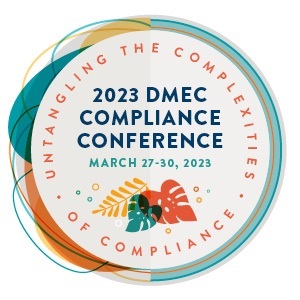
Workplace Mental Health
May/June 2023
The conversation about workplace mental health is expanding from a focus on treatment and support for mental illness to designing environments that protect and promote mental health and wellness. This issue of @Work magazine offers tips and tools to help employers reassess how they approach, invest in, and manage workplace mental health. With examples of successful employer approaches, suggestions for expediting safe return-to-work timelines, and more, there is abundant guidance on an age-old issue that threatens employee productivity, morale, and livelihood.
The CEO’s Desk
Flipping the Switch to Improve Workplace Mental Health and Safety
We’ve been in a mental health crisis for years and oftentimes feel ill-equipped to help when employee assistance programs aren’t enough and access to care is difficult to obtain. Yet absence and disability managers are in an ideal spot to advocate for mental health investments because we see firsthand how mental health issues can delay return-to-work timelines, increase treatment costs, and affect productivity. Read more.

Features
Managing Behavioral Health Disability Claims
Generalized anxiety disorder (GAD), a mental health condition, affects 6.8 million adults annually and is a common cause of workplace disability and unemployment. Employers must ensure that they engage and communicate with employees who are experiencing GAD and depression. These actions can improve outcomes and return-to-work time frames. Read more.

Managing Absenteeism in Remote Work Settings
Since remote work is increasingly common, employers must manage remote workers differently to stay ahead of employment trends. Finding new ways to connect and manage a virtual staff is the first step to creating a better working future. Read more.

Spotlight Articles
Employer Showcase
Stay-At-Work Approaches to Increasing Mental Health-Related Accommodation Requests
The team at University of Iowa Hospitals & Clinics supports leave and accommodation requests for direct patient care staff and those who support business operations. Accommodation requests for medical conditions, including mental health conditions, are up 55%, and leave requests are up 11% from 2020 overall. Based on this data, they recognized the need for better support to manage these events in a healthy way. Read more.

RTW Showcase
Exploring All Options to Improve Return-to-Work Motivation
Long-term disability (LTD) can have negative consequences on the lives of disabled workers and their families. An inability to return to work can lead to reduced psychological well-being and economic and social deprivation. Employers can prevent long-term absences and promote positive outcomes for disabled workers by prioritizing their physical and mental health to improve motivation for their return to work. Read more.

Employer Perspective
Dig Beneath the Surface to Ensure Empathy When Assessing Accommodation Requests
Most absence and disability managers aren’t trained mental health professionals. But we may be the first people to observe or address changes in behavior, which is when an integrated approach and collaboration with mental health experts prove most valuable to support employees. Read more.

Expanded Perspectives:
@Work to Share
DMEC provides the following @Work magazine articles and podcast episodes to offer additional perspectives on and increase awareness of integrated absence management trends and challenges. The resources — available to members and nonmembers — can be shared with your colleagues and through social media channels.
2023 Trends
What Does Your Paid Leave Program Say About You as an Employer?
Paid family and medical leave (PFML) is top of mind as more states implement these laws, and employers consider how they design, pay for, and administer these programs. In addition to operational differences, which can be dizzying for multistate employers, PFML is increasingly important to employees and can influence recruitment and retention. Read more.

Time for Change: Employers Can Help Turn the Tide with Mental Health Awareness and Treatment
Kristin Tugman, PhD, CRC, LPC, vice president of health and productivity and holistic wellness, Prudential, answers questions following the presentation “Mental Health at Work: Employee Rights and Employer Responsibilities” at the 2023 DMEC FMLA/ADA Employer Compliance Conference. Read more.

DMEC Podcast
Equalizing Mental and Physical Health in the Workplace
Setting expectations that employee health and wellness (physical and mental) are part of a manager’s responsibilities and training them to identify and address issues early will become increasingly important, says Dr. Kristin Tugman, vice president of health and productivity and holistic wellness for Prudential. She offers guidance and suggestions for how employers can equalize mental and physical health in the workplace in this podcast episode. Listen in.
DMEC Podcast
The Never-Ending Nature of Intermittent Leave
Despite best intentions, intermittent leave can disrupt the most productive teams, and some say it’s more susceptible to abuse. Yet creating policies with clear, regular communication can help employers ensure that everyone comes out whole, explains Lana Ruprecht, director, product compliance counsel, Reliance Matrix; and Marti Cardi, senior compliance consultant and legal counsel, Reliance Matrix. Listen in.
Questions Answered: How Can Employers Address and Support Mental Health Issues?
Dan Jolivet, PhD, workplace possibilities practice consultant at The Standard, answered questions from DMEC members in the DMECommunities Mental Health group in May 2023. The following excerpts provide a snapshot of the live event, which was open to DMEC members, who can access the full Q&A on DMECommunities, an online platform for discussing absence and disability management issues. Read more.

DMEC Podcast
Why Integrating Absence and Disability Management Improves Employee Experience
By integrating absence and disability management, employers leverage the information they have more effectively, create more positive employee experiences, and remove undue burdens to access, explains Sara Elder, JD, vice president of operations, Sedgwick. Learn how to protect your absence and disability managers from feeling like air traffic controllers in this episode. Listen in.
Building Bridges and Changing Lives One Leave Law at a Time
Recognizing greater fluidity in new leave laws, experts at the 2023 DMEC Compliance Conference advised employers to invest in management training and infrastructure to track hundreds of leave laws, which reach beyond traditional absence management definitions. Read more.

DMEC Podcast
Could “Pause Points” Help Reduce Employer Liability?
As managers and supervisors do more with less, adding “pause points” when working with employees and fielding requests for leave and accommodation could help employers avoid liability. Listen in as Kristin Jones, DMEC Director of Education Programs; and Jess Dudley, DMEC Education Manager, discuss the issue. Listen in.
Columns
Absence Matters
Why Addressing Mental Health Is the Right Thing to Do
It’s become evident in the last few years that employer-provided behavioral health support is more important than ever. A recent survey reports that 93% of employee benefits leaders believe mental health support will remain a high priority for the next three years. Employers that invest in mental health programs will see results in the bottom line. Read more.

Integrated Absence Management
Mental Well-Being at Home and Work: Getting Life Back on Track
With a 25% global increase in anxiety and depression and less access to quality mental healthcare, it’s not surprising that we’ve seen significantly more absenteeism and resignations. Disruptions at work and at home contribute to those increases. Traditional mental healthcare does not address these types of problems directly. A more effective approach is needed to help employees adapt to these challenges. Read more.

Engaging Today’s Workforce
How to Support Holistic Health Through Employee Care
Quiet quitting, career cushioning, and other increasingly common buzzwords in the corporate world have a common theme: a perceived lack of care for employees and their experience at work. However, demonstrating employee care — a genuine interest in employees’ overall well-being at work and away from work — can have a positive effect on talent management outcomes. Read more.

Employer Solutions
Is It Time to Reevaluate Your Mental Health Resources?
Mental health is not just a public health issue but a workplace issue. In 2022, 71% of U.S. employers said the deteriorating mental health of their workforce negatively affected their bottom line. Employers are in a unique position to help millions of Americans. The mental health support employers offer can and should include a range of resources because when it comes to mental health, one size does not fit all. Read more.

Common Sense Compliance
Support Access to Mental Health Treatment to Ensure Compliance
Workplace mental health has become a bigger focus for employers since the start of the pandemic. While employers are uniquely positioned to offer benefits that support employees’ mental health, they must adhere to employment laws. A growing number of leave and accommodation laws support access to mental health treatment and require employers to accommodate certain mental health conditions. Read more.

Featured Case
Handling Accommodation Requests from Employees with Mental Health Disabilities
Identifying and managing employees who have mental illnesses, such as depression, anxiety, and post-traumatic stress disorder, continues to challenge employers and garner attention from the Equal Employment Opportunity Commission. Explore how employers can better handle accommodation requests from employees with mental impairments. Read more.

Leave Technology
Paid Leave: A Competitive Advantage That Improves Employee Health
A well-communicated leave program is a critical way to help employees improve their health by alleviating stress, combating burnout, and improving work-life balance. These outcomes alone demonstrate why leave should be a cornerstone of any competitive benefits program. Read more.

The Disabled Workforce
Evaluating Accommodations When Discipline Is Involved
What do you do when an employee who is undergoing discipline says, “My disability made me do it”? When employees link discipline to claimed disabilities at the beginning of a performance issue or at the eleventh hour, supervisors need to know what to do and who to include in the discussions. Read more.

DMEC RESOURCES
DMEC News
Check out the latest DMEC resources including the DMEC Absence Plan Design and Practices Benchmarking Report, the 2023 DMEC Virtual Vendor Showcase, mental health articles and tools, and more. Read more.

Legislative Updates
Check out the latest federal, state, and local compliance updates on the DMEC Legislative Updates blog. Recent posts cover the end of the COVID-19 public health emergency, new protections for gig workers in Washington state, unpaid donor leave in Virginia, and more. Read more.
Be sure to follow DMEC on Twitter, Facebook, and LinkedIn for additional insight and up-to-date news.

Continue the Conversation
Share insights and ideas about the Workplace Mental Health issue with other DMEC members in the DMECommunities Mental Health Group. DMEC’s online networking groups give you the opportunity to connect with industry peers, ask/answer questions, share resources, and seek feedback. Get started.


@Work™ magazine is the official publication of the Disability Management Employer Coalition. Copyright© 2023. Disability Management Employer Coalition (DMEC). All rights reserved.
Editorial Policy
The goal of @Work is to present industry and Association news, highlight member achievements, and promote the exchange of specialized professional information. The statements and opinions expressed herein are those of the individual authors and do not necessarily represent the views of the Association, its staff, board of directors, or its editors. Likewise, the appearance of advertisers does not constitute an endorsement of products or services featured in this, past, or subsequent issues of this publication. DMEC makes no representations, warranties, or assurances as to accuracy of the information contained in the articles, and no content herein is legal or tax advice. Consult appropriate professionals for legal or tax advice.
Editorial Staff
Editor: Heather Grimshaw
Editorial Advisory Group Members: Linda Croushore, Rebecca Fisco, Jenny Haykin, Terri Morris, Fred Schott, Jessica Thornton, and Lori Vickory








